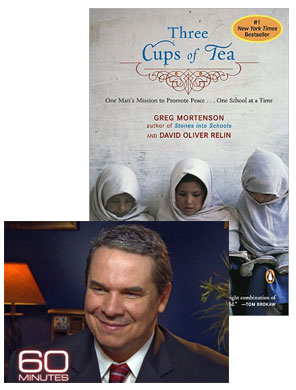Greg Mortenson: Not a Publishing Scandal
 About a month ago, I was checking out one of the display tables at a local Borders when I discovered that Greg Mortenson’s two books about building schools for impoverished communities in Pakistan and Afghanistan, the bestselling Three Cups of Tea and its follow-up, Stones into Schools, were available in a “buy one, get one 50% off” promotion. I’d been meaning to read them for a while, for an essay I’ve had in mind, so I picked them up, but I’ve been working on other projects, and I still hadn’t read them when, last Friday afternoon, I saw a story in Jacket Copy, the LA Times book blog, about a 60 Minutes investigation into Mortenson and his non-profit organization, the Central Asia Institute.
About a month ago, I was checking out one of the display tables at a local Borders when I discovered that Greg Mortenson’s two books about building schools for impoverished communities in Pakistan and Afghanistan, the bestselling Three Cups of Tea and its follow-up, Stones into Schools, were available in a “buy one, get one 50% off” promotion. I’d been meaning to read them for a while, for an essay I’ve had in mind, so I picked them up, but I’ve been working on other projects, and I still hadn’t read them when, last Friday afternoon, I saw a story in Jacket Copy, the LA Times book blog, about a 60 Minutes investigation into Mortenson and his non-profit organization, the Central Asia Institute.
The case against Mortenson is twofold: One, that he seriously distorted key elements of his life story to boost its inspirational qualities; two, that his charitable foundation spends a lot more money promoting Greg Mortenson than it does building schools in Central Asia. I’ve been through a couple of these “fake memoir” scandals before, so I spent some time yesterday afternoon talking with The Daily Beast about how this might affect the publishing industry. I didn’t wind up in the final cut of that story, but I can give you my short answer: Probably not very much, really. The 60 Minutes segment was primarily concerned with Mortenson’s alleged lies, and had nothing meaningful to say about the role of Viking and Penguin in disseminating those alleged lies as his publishers. That’s fine: They undoubtedly believed in the commercial potential of Mortenson’s inspirational story, and wanted it to be as true as it was presented to them as being, and had little reason to doubt it was true. So, with any luck, we’ve been spared the ritual hand-wringing about what is to be done about the fake memoirs this time around.
And, yet, it’s not as if there weren’t any signs this day might come…
While I was waiting for the 60 Minutes segment to air last night, I read the opening pages of Three Cups of Tea, and I was immediately struck by a passage from the introduction by Mortenson’s co-author, David Oliver Relin:
“His fluid sense of time made pinning down the exact sequence of many events in this book almost impossible, as did interviewing the Balti people with whom he works, who have no tenses in their language and as little attachment to linear time as the man they call Dr. Greg.”
That’s right: The journalist hired to turn Mortenson’s story into a publishable book essentially threw his hands in the air and declared we’d have to take it on faith. Why? “I want to see Greg Mortenson succeed,” Relin says a bit later on. “I wish him success because he is fighting the war on terror the way I think it should be conducted… If we Americans are to learn from our mistakes, from the flailing, ineffective way we, as a nation, conducted the war on terror after the attacks of 9/11, and from the way we have failed to make our case to the great moderate mass of peace-loving people at the heart of the Muslim world, we need to listen to Greg Mortenson.” You can already see people lining up to make similar defenses of Mortenson: It doesn’t matter if some parts of his story aren’t 100% accurate, they argue in the Jacket Copy comments section, because he’s doing such good work. But that just brings us back to the question of whether he and the Central Asia Institute are doing such great work… and all I can tell you about that is: Spending more money to promote your charity than you do on the actual work of your charity is bogus, and so is lying in order to persuade people to donate to your charity.
18 April 2011 | uncategorized |

 Our Endless and Proper Work is my new book with Belt Publishing about starting (and sticking to) a productive writing practice.
Our Endless and Proper Work is my new book with Belt Publishing about starting (and sticking to) a productive writing practice. 
